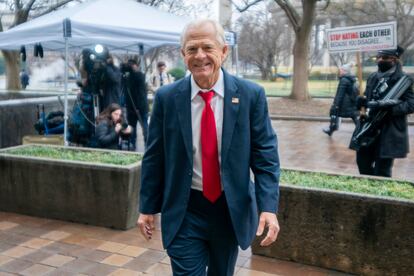Trump White House official Peter Navarro gets a four-month sentence for defying a House Jan. 6 subpoena
Navarro served as a trade adviser under then-President Donald Trump and later promoted the Republican’s baseless claims of mass voter fraud in the 2020 election

Trump White House official Peter Navarro, who was convicted of contempt of Congress for refusing to cooperate with a congressional investigation into the Jan. 6, 2021, attack on the U.S. Capitol, was sentenced on Thursday to four months behind bars.
He was the second Trump aide convicted of contempt of Congress charges, after former White House adviser Steve Bannon, who also got a four-month sentence but is free pending appeal.
Navarro was found guilty of defying a subpoena for documents and a deposition from the House Jan. 6 committee. He served as a White House trade adviser under then-President Donald Trump and later promoted the Republican’s baseless claims of mass voter fraud in the 2020 election he lost to Democrat Joe Biden.
He has vowed to appeal the verdict, saying he couldn’t cooperate with the committee because Trump had invoked executive privilege. A judge barred him from making that argument at trial, however, finding that he didn’t show Trump had actually invoked it.
Navarro said in court before his sentencing Thursday that the House committee investigating the Jan. 6 attack had led him to believe that it accepted his invocation of executive privilege. “Nobody in my position should be put in conflict between the legislative branch and the executive branch,” he told the judge.
The judge told Navarro that it took “chutzpah” for him to assert that he accepted responsibility for his actions while also suggesting that his prosecution was politically motivated. “You are not a victim. You are not the object of a political prosecution,” the judge said. “These are circumstances of your own making.
Navarro’s lawyers had advised him not to address the judge, but he said he wanted to speak after hearing the judge express disappointment in him. Responding to a question about why he didn’t initially seek a lawyer’s counsel, he told the judge, “I didn’t know what to do, sir.”
The judge is allowing Navarro’s defense to submit a written brief on the question of allowing him to remain free pending appeal.
Justice Department prosecutors said Navarro tried to “hide behind claims of privilege” even before he knew what the committee wanted, showing a “disdain” for the committee that should warrant a longer sentence. Prosecutors had asked a judge to sentence him to six months behind bars and impose a $200,000 fine.
Defense attorneys said Trump did claim executive privilege, putting Navarro in an “untenable position,” and they asked for a sentence of probation and a $100 fine.
Bannon, who also made executive-privilege arguments, was convicted of two counts.
Navarro’s sentencing comes after a judge rejected his bid for a new trial. His attorneys had argued that jurors may have been improperly influenced by political protesters outside the courthouse when they took a break from deliberations. Shortly after their break, the jurors found Navarro guilty of two misdemeanor counts of contempt of Congress.
But U.S. District Judge Amit Mehta found that Navarro didn’t show that the eight-minute break had any effect on the September verdict. He found no protest was underway and no one approached the jurors — they interacted only with each other and the court officer assigned to accompany them.
Sign up for our weekly newsletter to get more English-language news coverage from EL PAÍS USA Edition
Tu suscripción se está usando en otro dispositivo
¿Quieres añadir otro usuario a tu suscripción?
Si continúas leyendo en este dispositivo, no se podrá leer en el otro.
FlechaTu suscripción se está usando en otro dispositivo y solo puedes acceder a EL PAÍS desde un dispositivo a la vez.
Si quieres compartir tu cuenta, cambia tu suscripción a la modalidad Premium, así podrás añadir otro usuario. Cada uno accederá con su propia cuenta de email, lo que os permitirá personalizar vuestra experiencia en EL PAÍS.
¿Tienes una suscripción de empresa? Accede aquí para contratar más cuentas.
En el caso de no saber quién está usando tu cuenta, te recomendamos cambiar tu contraseña aquí.
Si decides continuar compartiendo tu cuenta, este mensaje se mostrará en tu dispositivo y en el de la otra persona que está usando tu cuenta de forma indefinida, afectando a tu experiencia de lectura. Puedes consultar aquí los términos y condiciones de la suscripción digital.








































